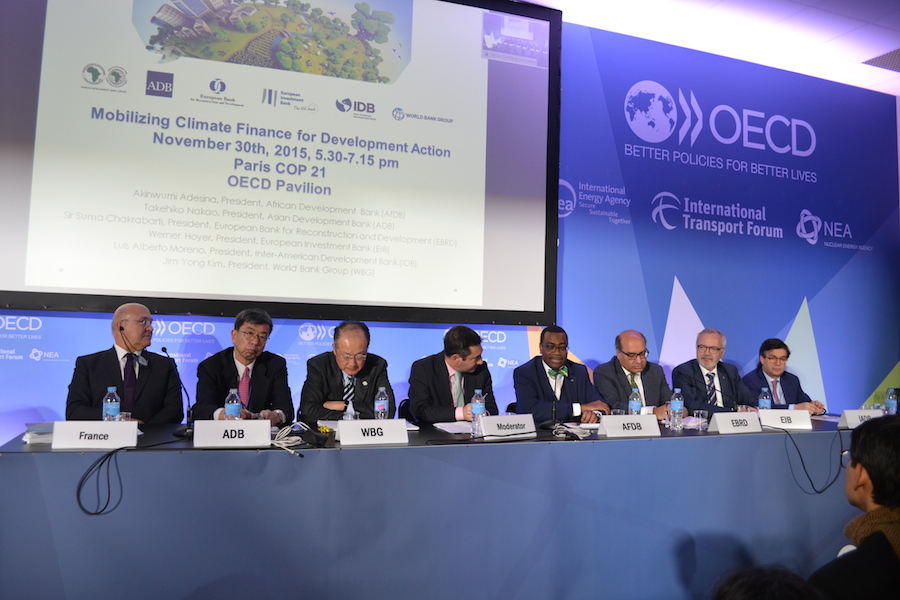
By Aaron Kaah
Multilateral development banks (MDBs) at the twenty-first conference of the United Nations Framework Convention UNFCCC holding in Paris today identified climate financing for development action as a crucial step in putting the world on the pathway for sustainable development.
In a joint statement, the heads of African Development Bank (AfDB), Asian Development Bank (ADB), European Bank for Reconstruction and Development (EBRD), European Investment Bank (EIB), Inter-American Development Bank (IDB), and the World Bank Group (WBG) pledged to further mobilize public and private finance to help countries reduce greenhouse gas emissions and adapt to climate change.
The leaders reiterated their commitment to “considering climate change across our strategies, programs, and operations to deliver more sustainable results, with a particular focus on the poor and most vulnerable.”
It noted that the six institutions had already delivered US$100 billion for climate action in developing and emerging countries in the four years since starting to track climate finance in 2011.
The statement followed on commitments in recent weeks by the MDBs to increased financing for climate change mitigation and adaptation over the next few years.
The MDBs “pledge to increase our climate finance and to support the outcomes of the Paris conference through 2020,” the statement read. “Each of our organizations has set goals for increasing its climate finance and for leveraging finance from other sources… These pledges support the US$100 billion a year commitment by 2020 for climate action in developing countries.”
According to Akinwumi Adesina, President of the African Development Bank Group, “Africa has already been short-changed by climate change.” Now, we must ensure that Africa is not short-changed in terms of climate finance. The African Development Bank stands fully ready to support greater climate financing for Africa,” he added.
Mr. Adesina stated that since Africa was growing in double digits, the AfDB will pump $50 billion in the next ten years for energy development, agricultural and youth empowerment in Africa.
He further admitted that all fingers are not the equal hence those who pollute more have greater moral responsibility to fund more climate-resilient projects in vulnerable countries of the world.
Already UNFCCC has acknowledged the receipt of climate action plans from 183 countries laying out plans to tackle climate change and to reduce emissions.
The AfDB president cited new delivery platforms as assets in the execution and implementation of this project.
He urged the industralised countries to fund and support Africa most especially in the quest for a sustainable development pathway.
President Jim Yong Kim of the World Bank Group declared that “we have the resources, we have the collective will, and we have a clear roadmap in the national plans that our clients have submitted ahead of Paris.”
On his own part, Takehiko Nakao President of the Asian Development Bank believes that “climate finance is critical to mitigate and adapt to climate change impacts.” However, finance alone is not enough. “It is imperative that we combine increased finance with smarter technology, stronger partnerships and deeper knowledge,” he said.
Sir Suma Chakrabarti, president of European Bank for Reconstruction and Development (EBRD) reckons that with their long experience as leaders in climate finance, “the Multilateral Development Banks are making important contributions to combatting climate change, using their strong base of expertise to step up green finance, policy advice and the mobilization of crucial private sector funding.”
For its part the EBRD is further scaling up its climate finance activity through the implementation of its recently approved Green Economy Transition approach.
The Inter-American Development Bank (IDB) In the run-up to COP21, confirmed working with many countries in designing their national contributions towards tackling climate change. The IDB President Luis Alberto Moreno further stated that following the Paris conference, “we will help countries to translate these into investment plans that successfully attract the necessary capital for full implementation.”











